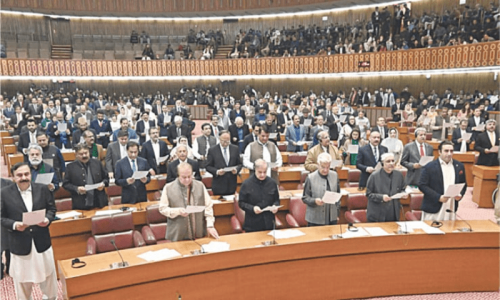
“This is a Sherlock that exists in a universe which none of the other Sherlocks have — a universe where Enola exists,” Henry Cavill told Variety from the red carpet of his film Enola Holmes 2. “It allows for a different shade to Sherlock because he’s a supporting character. It’s no longer about him, it’s about Enola and it’s her story.”
Yet, to an acceptable extent, the sequel to Enola Holmes, produced by and starring Millie Bobby Brown as the titular character, is also about Sherlock. It would, after all, be a misstep to waste Cavill in a cameo — or (gasp) not feature him at all.
In a side-plot to Enola’s — which doesn’t adapt any particular story from Nancy Springer’s book series of the same name — Sherlock is flummoxed by the case of disappearing government money. Eventually, he finds out that the case may be the work of a criminal mastermind (we will not mention his nemesis’s name here, but for those who don’t know, let’s hide the surprise, because it is a spoiler).
While Sherlock toils away, Enola finds out that it is not easy being both young and a female running her own detective agency.
There can be no denying the fact that Enola Holmes 2 is a pro-women film where the men are simply supporting characters
Battling the same befuddled expressions Stephanie Zimbalist’s Laura Holt encountered when she opened her detective agency in the hit television series Remington Steele, Enola is eclipsed by her brother’s adventures.

Despite attesting that she, in fact, was successful in her first case from the first film, she gets no jobs… until, a young girl named Bessie (Serrana Su-Ling Bliss) wants Enola to find her missing sister Sarah (Hannah Dodd), who just vanished one day. Their other sister, Mae (Abbie Hern), who works with Bessie at a matchstick producing factory, is less welcoming to the inquiries.
As Enola digs up facts, one realises the actuality of Cavill’s statement: Enola Holmes lives in a radically different universe; one where today’s proactive statements and agendas have to lend themselves to the settings, the story and the characters.
Bessie, Mae and Sarah are “found sisters” — that is, they share the same name but belong to East Asian, African American and Caucasian heritage.
While one can buy the fact that these girls became a surrogate family of sorts, one is less inclined to accept Adeel Akhtar’s Lestrade (he was also in part one), Himesh Patel’s version of Dr John Watson, who appears at the tail end of the movie, or the suffragist and pioneering martial artist Edith Margaret Garrud’s version played by Susie Wokoma.

The real life Edith was Caucasian, as were Lestrade and Watson; Wokoma is African-American, Akhtar and Patel are South Asians (one’s parents hail from Pakistan and Kenya, the other’s are from India). Aren’t these flips of ethnicities — whether they are based on real life people or those established in fiction — just another form of statement-making bias?
Present day proclivities, however, seem to be in the genes of this film franchise.
Enola’s radical-terrorist mother (Helena Bonham-Carter; excellent as always) and her suffragist friend Edith are busy exploding mailboxes and carriages, as long as they get to spread the word about women’s rights.
The other women in the film, be it Enola or the workers at a matchstick factory — who, by the way, are dying of exposure to chemicals — are looked down on by men. By the end, and that too quite haphazardly, they rally against their corporate overlords in a history-making move. “The Matchgirl Strike, led by Sarah Chapman, was the first ever industrial action taken by women for women. It improved their working conditions forever” reads a statement during the end credits.
The sudden revelation of the Matchgirl Strikes feels tacked on but, nevertheless, there is no denying the fact that Enola Holmes 2 is a pro-women film, where the men are supporting characters.
With exception to Sherlock and the young lord Tewkesbury (Louis Partridge), Enola’s love interest, most of the men are evil capitalists, shrewd, money-grabbing stage managers or corrupt bad cops (David Thewlis as Superintendent Grail in a badly written role).
The cliches run hard here but, if you squint your eyes to blur the overtones, you may yet enjoy the fast-paced screenplay and direction by Jack Thorne and Harry Bradbeer, respectively. The sequel is faster, has better production quality and less annoying use of Enola’s fourth-wall-breaking conversations.
As an escapist film, Enola Holmes 2 is pleasant fun. It could have easily been a worldwide theatrical release but, being a big budget Netflix original, you can watch it right now on your PC, TV or mobile devices.
Rated suitable for audiences aged 18 and over — why I don’t know, the first movie was suitable for ages 13 and over, as is this one — Enola Holmes 2 is running at the No. 1 spot on Netflix
Published in Dawn, ICON, November 13th, 2022
















































